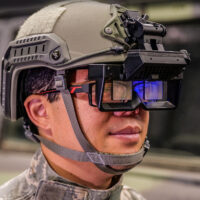Helmet mounted displays are designed to enhance situational awareness and deliver information to military aircraft and helicopter pilots, overlaying this information on their normal field of view as a form of augmented reality. The information may include altitude, speed and heading, tactical data from sensors and weapons systems, and environmental and terrain data.
Tactical & Helmet Mounted Display Systems
Tactical helmet displays may track the position and orientation of the pilot’s head, allowing the pilot to cue sensors and weapons to the direction in which they are looking. This ability is highly useful for both air-to-air and air-to-ground combat, and may also allow the pilot to “see” in any direction through the aircraft.
Helmet-mounted displays for fighter pilots need to be as light as possible due to the high g-forces experienced by fighter aircraft, and may be constructed with lightweight polymer materials. This is less of a concern for helicopter pilots, and so their helmet-mounted displays may be more elaborate. Aircraft pilot helmet displays may also need to withstand the forces exerted upon them during ejection.
Helmet-mounted displays may be monocular or binocular, and provide compatibility with night vision systems. They may also be able to display information in full color, providing the ability to designate friendly and enemy aircraft and forces in different colors. The helmet display may also be able to receive live video feeds from other aircraft, UAVs (unmanned aerial vehicles) or ground forces. The helmet itself may provide 3D audio capabilities and active noise reduction.
Augmented Display & HUD Technology
Tactical augmented display technologies are also currently under development for infantry soldiers. Proposed solutions typically involve a single eyepiece that attaches to the soldier’s helmet, displaying a map as well as information such as targeting data and GPS coordinates. Military HUD (heads-up display) helmets are still in the experimental phase with several HUD helmet designs currently under development.














